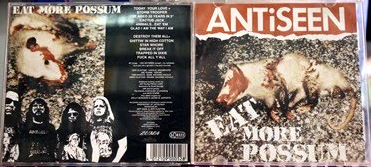I just noticed the popular southern phrase “Eat More Possum” is referenced in a legal analysis of the Chick-fil-A “Eat Mor Chikin” claims against “Eat More Kale“.
Here you can watch Jerry Jeff Walker sing it in 1984, at 1:50
The punk band Antiseen of Charlotte, North Carolina published an entire album called Eat More Possum in March 1993 with a cover image of a dead and bloody possum on asphalt.

Ironic, no? Who saw Antiseen?
That means it was not long after this Antiseen Eat More Possum album was publicly released, and many years after the phrase “eat more…” had been in common use, that Chik-fil-A hired a $1 billion dollar ad agency who suggested they say “Eat Mor Chikin”.
To put it another way, that same ad agency first tried to copy a phrase from the Simpsons.

And thus an ad agency might have then thought using an already common phrase in America, seen on an album and in recordings pre-dating the billboards, was unlikely to be uncovered by a client in 1995. Or more likely they preferred lots of prior use, given how they copied the Simpsons too (and Don’t Have a Cow also is an old phrase).
Today the prior art is more easily found, but it really was never hard to find in the first place.